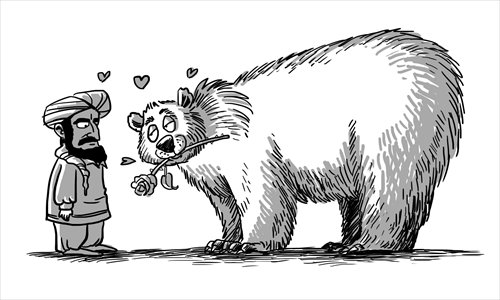Russia backs Pakistan in geopolitical shift

Russian President Vladimir Putin was set to visit Pakistan on October 2, but at the eleventh hour he postponed his visit to an as yet unannounced date. This was followed by cancellation of his visits to India and Turkey.
Putin's cancelled tour won't necessarily affect Russia's attempts at rapprochement with Pakistan, after a historically difficult relationship which reached its nadir in the early 1980s, during the Soviet invasion of Pakistan's neighbor Afghanistan.
There are some significant geo-strategic developments taking place in Russia's neighborhood. The US is increasing its influence in the Asia-Pacific, in cooperation with India, to dominate the sea lanes of the region. Pakistan provides an alternative route which is closer to Africa, Europe and the Middle East, and is accessible to Russia through Central Asia.
Pakistani President Asif Ali Zardari, during his visit to Moscow in May, offered Russia the use of Pakistani territory to gain access to the southern seas. The strategic developments taking place in the Asia-Pacific are a challenge, but they also present an opportunity to the regional countries to form a strong economic-strategic block.
Pakistan is diversifying its foreign policy. Recently it has improved its relations with China, Brazil, Malaysia, Indonesia and Turkey, and is working on its ties with Russia, India, Germany and France, attempting to reduce its dependency on the US. The emphasis is on trade instead of aid.
Russia is also looking for new partners in the South Asian region. Russia's relations with India are not as good as they used to be. India, which was a significant buyer of Russian weapons and defense system, is now a major US partner. Putin has signaled his willingness to adapt Russia's foreign policy to the new geopolitical changes.
India is apprehensive about Pakistani-Russian rapprochement. In past two months, a number of events have taken place, which indicates that Russia is giving preferences to Pakistan over India.
Former Russian defense minister Anatoly Serdyukov postponed his visit to India, where he was to participate in the Indo-Russian Inter-Governmental Commission on Military-Technical Cooperation.
The meeting was scheduled for October 4, but instead Sardyukov preferred to meet with Pakistan's Chief of Army Staff General Pervaiz Ashraf Kayani, who had on the very same day arrived in Russia on an official visit.
Before that Pakistan's Chief of Air Staff Tahir Rafique Butt also visited Moscow, where he visited air force related defense installations and had meetings with military high-ups. Pakistan and Russia have also agreed to boost their defense ties.
Later on, Russian Foreign Minister Sergey Lavrov cancelled his visit to India and landed in Pakistan, where he tried to clarify the misperceptions that had arisen due to the postponement of Putin's visit to Pakistan.
He also expressed Russia's support for Pakistan's stance on drone attacks and Afghanistan. Pakistan's foreign office issued a statement on Lavrov's visit that read "The two countries also share the common objective of peace and stability in the broader region and attach importance to regional connectivity both in terms of trade and energy cooperation."
The situation in Afghanistan is another factor that requires closer cooperation between the two.
Contrary to the US perceptions, Russia realizes that Pakistan is an important actor and must be included in any peaceful settlement of conflict in Afghanistan. After the withdrawal of foreign forces from Afghanistan, the roles and concerns of regional countries will be further enhanced.
The way forward for the regional countries is to enhance mutual cooperation in terms of trade, investment and economical activities. Mutual economic incentives will create an environment for interdependence and decrease the chances of future conflicts.
Russia, China, Pakistan, Central Asian States and Iran, acting through the Shanghai Cooperation Organization and other multilateral and bilateral forums, should focus more on the promotion of regional commerce and trade. Trade entails prosperity which leads to peace at home and abroad. Closer regional cooperation will discourage involvement of external powers, which manipulate the differences among regional states for their own interests.
A sustainable and long-term bilateral relationship should be based on mutual interests, mutual respect for each other's territorial sovereignty, and non-interference in each other's internal affairs.
Pakistan-Russia relations should not be seen as a substitute for Pakistan-US relations. No country can replace the other. Global affairs call for cooperation between regional countries. Islamabad and Moscow have comprehended the fact that multidimensional relations open up channels for multiple benefits.
The author is a researcher at the Islamabad Policy Research Institute. aftabhussein@hotmail.com